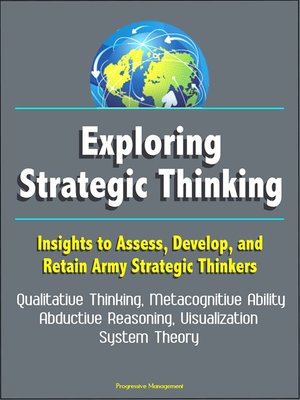Exploring Strategic Thinking
ebook ∣ Insights to Assess, Develop, and Retain Army Strategic Thinkers--Qualitative Thinking, Metacognitive Ability, Abductive Reasoning, Visualization, System Theory
By Progressive Management

Sign up to save your library
With an OverDrive account, you can save your favorite libraries for at-a-glance information about availability. Find out more about OverDrive accounts.
Find this title in Libby, the library reading app by OverDrive.



Search for a digital library with this title
Title found at these libraries:
| Loading... |
This research product provides a thorough examination of the question: "How can the Army assess, develop, and retain strategic thinkers?" Expert input from within and outside the military provide a variety of perspectives that highlight areas of convergence and divergence, as well as, exemplar techniques, processes and insights that inform and change the conceptualization and practice of strategic thinking in the military. This compendium does not provide the answer to all of the Army's strategic thinking challenges, but it does provide many possible avenues to explore with the goal of enhancing the Army's strategic thinking capabilities. Topics and subjects covered include: qualitative thinking, metacognitive ability, cognitive flexibility, abductive reasoning, system theory, critical thinking, visualization, PME curriculum, strategic theory.Section 1: Strategic Thinking - Big Picture * Chapter 1: The Identification and Education of U.S. Army Strategic Thinkers * Chapter 2: Strategic thinking: Requirements, Development, and Assessment * Chapter 3: Recruiting, Training, and Developing Strategic Thinkers * Section 2: Impact of Culture * Chapter 4: Developing Army Strategic Thinkers * Chapter 5: The Sociology of STRATEGY: Romancing the Image * Chapter 6: Creating an Organizational Culture to Support Strategic Thinking * Chapter 7: Implementing a Culture of Strategic Thinking in the U.S. Army * Section 3: Insights from Outside the Military * Chapter 8: Strategic Intuition in Army Training * Chapter 9: Creativity in Strategic Thinking * Chapter 10: Strategic Thinking. A Design Contribution * Section 4: Ways of Thinking * Chapter 11: Professional Military Education's Imperative of Linear/Nonlinear Thinking Style Balance for Improved Strategic Thinking * Chapter 12: A Science of Context: The Qualitative Approach as Fundamental to Strategic Thought * Chapter 13: The Genome Doodle of Strategic Thinking: Times, Epistemologies, and NarrativesTo begin understanding strategic thinking in the military, one must first have a basic sense of what strategic thinking is and what it is not. Examination of literature on strategic thinking does not lead to one common definition of strategic thinking. However, there are some identified common attributes of strategic thinking. Strategic thinking is built on a systems perspective, intent driven, hypothesis driven, intelligently opportunistic (capitalizing on new possibilities as the situation changes), and involves the ability to think in time (linking past, present, and future elements).The confusion about the definition of strategic thinking is exacerbated by the confounded concepts of strategic thinking, strategic planning, strategy, and the strategic thinker. In addition to the lack of common definition of strategic thinking, Heracleous notes that there is no common definition of strategic planning or common understanding of the relationship between strategic thinking and strategic planning. Liedtka outlines several differences between strategic thinking and strategic planning that include reliance on systems thinking, the role of measurement and control, and a focus on the outcome (strategy) versus the process. For the purpose of this compendium, we have focused extensively on concepts related to strategic thinking (cognitive processes) and the strategic thinker (characteristics of a person). This work does not extensively address the concepts of strategy (outcome) or strategic planning (programmatic, analytical process). Strategic thinking in the military comes with unique challenges and opportunities. It is different than strategic thinking in the private sector.






